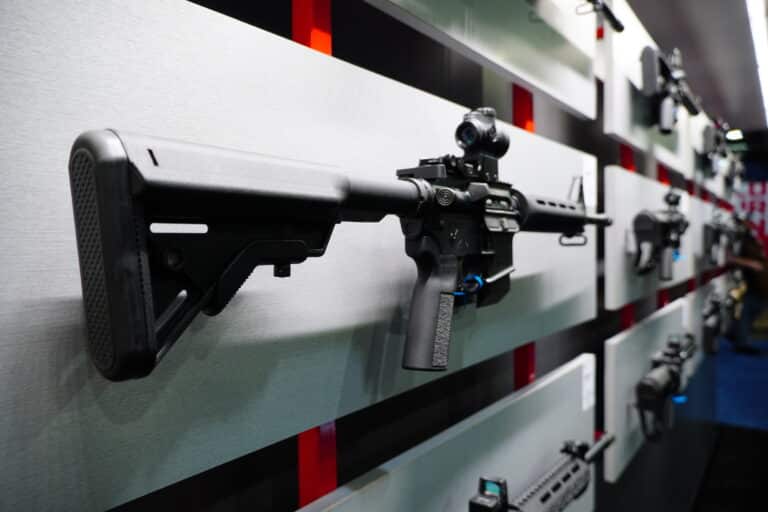The Department of Justice (DOJ) just urged the Seventh Circuit Court of Appeals to strike down Illinois’s “assault weapon” and magazine restrictions.
In a brief filed late last week, the DOJ asked the court to extend Second Amendment protections to ammunition magazines, AR-15s, and other firearms targeted by the state’s ban. The DOJ argued the court should reverse its previous analysis upholding the state’s ban on what it labelled “militaristic“ weapons in 2023’s Bevis v. City of Naperville. The brief said the appeals court should instead side with the district court that initially blocked the law.
“Because the Act is a total ban on a category of firearms that are in common use by law-abiding citizens for lawful reasons, it is flatly unconstitutional,” the DOJ wrote in its amicus brief in Barnett v. Raoul. “This Court should affirm the district court’s injunction.”
The DOJ released the brief in the wake of the Supreme Court’s decision to deny cert to Snope v. Brown, a case challenging Maryland’s “assault weapon” ban. The Supreme Court has yet to address whether AR-15s or other firearms whose sales are usually outlawed by such bans enjoy constitutional protections. The brief represents a shift in the DOJ’s view of the issue since President Donald Trump returned to office, with the department now arguing that the guns are protected, following an order to review its position on the matter.
“President Donald J. Trump has instructed his Administration to ‘protect the Second Amendment rights of all Americans,” the DOJ explained in the brief. “Attorney General Pamela Bondi has likewise instructed the Department of Justice to use its full might to protect the Second Amendment rights of law-abiding citizens.”
Assault weapons bans, which generally outlaw the sale of semi-automatic firearms capable of accepting detachable magazines and containing a set number of regulated ergonomic or cosmetic features, have been adopted by nine states and the District of Columbia. They have long been at the center of the political fight over American gun laws, especially since they target one of the most popular firearms in the country: The AR-15.
The AR-15 is a lightweight, semi-automatic rifle that has dominated the sales market and public attention for decades. Recent polling from The Washington Post and Ipsos indicates roughly 1 in 20, or 16 million, Americans own an AR-15.
In 2023, Illinois passed a ban on AR-15s and other so-called assault weapons. The state defines assault weapon as “a semiautomatic rifle that has the capacity to accept a detachable magazine or that may be readily modified to accept a detachable magazine” wit at least one of the following: pistol grip, thumbhole stock, protunding grip, folding stock, telescoping stock, detatchable stock, flash suppressor, grenade launcher, or shroud. New sales of firearms that fit the description, including the AR-15, are banned under the law.
Gun-rights advocates immediately challenged the law, which has been blocked and upheld by different state and federal courts ever since. Now, the DOJ is jumping in on their side.
“The AR-15 is the most popular civilian rifle in America and is used by tens of millions of law-abiding Americans for lawful reasons,” acting Associate Attorney General Chad Mizelle, who filed the brief, posted on social media. “Total bans on AR-15s are a flagrant violation of the Second Amendment. Today, the Department of Justice filed an Amicus Brief telling the Seventh Circuit that Illinois’ law banning AR-15s is unconstitutional under the Second Amendment.”
The DOJ’s involvement hasn’t persuaded backers of the ban, though. Illinois Governor JB Pritzker (D) defended his state’s law in a press conference on Monday.
“They obviously don’t understand the damage that’s being done across the country where there are no assault weapons bans,” he said. “They are wrongheaded on so many things, but this is yet another of those.”
The DOJ’s brief outlined the department’s legal argument against the bans based on the popularity of AR-15s, recent Supreme Court statements, and the idea that history shows “militaristic“ firearms are constitutionally protected. It encouraged the Seventh Circuit to apply Second Amendment protections to the guns, asking it to consider recent statements made by the Supreme Court Justices who dissented in the denial of Snope.
“First, as explained below, key aspects of Bevis’s analysis are wrong, even judged against the Supreme Court’s Second Amendment caselaw that existed at the time,” the DOJ wrote. “Second, multiple Supreme Court Justices (including Bruen’s author) have since made it clear that they disagree with Bevis and other recent lower-court opinions, and that the Court is likely to grant certiorari ‘in the next Term or two’ to address the errors in those opinions.“
In the Snope denial, Justices Clarence Thomas and Brett Kavanaugh both cast doubt on the constitutionality of AR-15 bans. Kavanaugh, who voted against taking up the case, said the Supreme Court would take up a challenge to an AR ban case sooner rather than later.
“This case primarily concerns Maryland’s ban on the AR–15, a semi-automatic rifle. Americans today possess an estimated 20 to 30 million AR–15s,” he wrote. “And AR–15s are legal in 41 of the 50 States, meaning that the States such as Maryland that prohibit AR–15s are something of an outlier. Given that millions of Americans own AR–15s and that a significant majority of the States allow possession of those rifles, petitioners have a strong argument that AR–15s are in ‘common use’ by law-abiding citizens and therefore are protected by the Second Amendment under Heller.”
Kavanaugh outright questioned the legitimacy of the lower court’s decision upholding Maryland’s ban, which is very similar to the one enacted by Illinois.
“In short, under this Court’s precedents, the Fourth Circuit’s decision is questionable,” he wrote. “Although the Court today denies certiorari, a denial of certiorari does not mean that the Court agrees with a lower-court decision or that the issue is not worthy of review.”
DOJ also rejected the claim that “militaristic“ firearms are not “arms“ under the Second Amendment, saying that the Seventh Circuit panel’s previous holding “fails as a matter of text, history, and precedent.”
“Although the militia-related purpose announced in the Second Amendment’s prefatory clause is not ‘the only reason Americans valued the ancient right‘ to keep and bear arms, the prefatory clause’s text did capture ‘the purpose for which the right was codified,‘ which was ‘to prevent elimination of the militia,‘” the DOJ wrote in their brief. “The contrary claim that ‘militaristic’ weapons fall outside its scope wrongly requires reading the prefatory clause entirely out of the Second Amendment.”
The DOJ challenged the idea that the guns Illinois banned fit under the “dangerous and unusual” category.
“AR-15s also are not ‘dangerous,’ at least as that term is used in Second Amendment caselaw,” the DOJ wrote in the brief. “Of course, all firearms are ‘dangerous’ in some sense.”
The DOJ said that dangerousness is only relevant if the firearm rises to the level of being “uniquely dangerous” or “especially dangerous.” The DOJ claimed the AR-15 is neither of those things, since the way they function is similar to other firearms, such as handguns.
“There is no meaningful … distinction between semi-automatic handguns and semi-automatic rifles,” the DOJ wrote. It further argued it would “strain logic and common sense to conclude that the Second Amendment protects semi-automatic handguns but does not protect semi-automatic rifles.”
The DOJ made similar arguments about the ammunition magazine ban. It pointed to the popularity of the magazines Illinois has banned.
“So-called ‘large-capacity magazines’ are extremely common in the United States,” the DOJ wrote. “‘Americans have in their hands and homes an estimated 100 million … magazines’ that hold more than ten rounds of ammunition.”
Ultimately, it came to the same conclusion: Illinois’s ban is unconstitutional.
“Because the Act bans the possession of magazines and other firearm attachments that are in common use by law-abiding citizens for lawful reasons, it violates the Second Amendment,” the department wrote.






